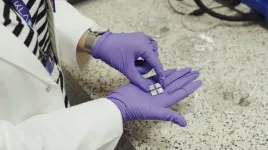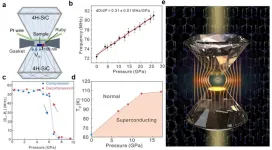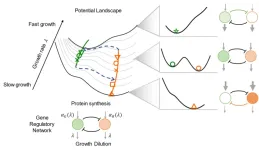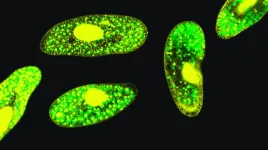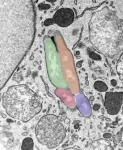(Press-News.org) Scientists from Swansea University ‘s Institute for Innovative Materials, Processing and Numerical Technologies (IMPACT) and Japan have been awarded £1.3 million to develop a new “point of care testing” kit that can detect biomarkers for Alzheimer's Disease.
The project follows Dr Sanjiv Sharma’s ground-breaking work in this area and the development of the world’s first COVID-19 ‘smart patch’.
Compared to hypodermic single needles, a ‘smart patch’ consists of a collection of tiny needles - microneedles - created to break the skin barrier in a minimally invasive manner, similar to a nicotine patch. Their innovative design means they can be developed to identify and monitor specific biomarkers in the skin.
This new major project will see Dr Sharma lead a consortium of leading scientists from Swansea University, Imperial College London and The University of Glasgow. Dr Kaori Tsukakoshi will steer researchers from Japan with Tokyo University of Agriculture & Technology and National Institutes for Quantum Science & Technology. Together they will create a Point-of-Care Testing Kit to facilitate early diagnosis and monitoring of disease progression in primary clinics or home settings.
Dr Sanjiv Sharma of Swansea University comments:
"Alzheimer’s Disease (AD) is the most prevalent form of dementia. It is presently untreatable and associated with a high social and familial burden, for which national health systems are not prepared, constituting a major challenge for sustainable development.
Over a million people in the UK are predicted to have dementia by 2025 and with the current cost of £26 billion a year to the UK economy, there is a huge financial and societal impact. Similarly, Japan’s aging population is witnessing an increase in AD. This increase of total prevalent AD cases in those ages 60 years and older from 3.5 million cases in 2016 to 4.9 million cases in 2026 corresponds to an annual growth rate of 4%. There are similar trends seen globally.
As disease modifying-treatments (DMT) for AD are becoming a possibility, evidence suggests any effective preventive or DMT must be started very early in the disease process, stressing the importance of an early diagnosis based on easily accessible biomarkers. Thus, the development of non-invasive markers of AD pathology in blood and skin samples is essential for screening the elderly population with memory complaints and could represent the first step to determine individuals at greatest risk of AD dementia."
Dr Kaori Tsukakoshi of Tokyo University of Agriculture and Technology comments:
“In the last decade, blood biomarkers for AD diagnosis have been extensively studied and are finally being established. Our collaborative research focusing on the development of the Point-of-Care Testing device for the AD biomarkers would facilitate a new diagnostic process of AD, which will enable more patients with AD to be led to upcoming DMT for AD.”
This is a multidisciplinary research project co-funded by the Medical Research Council – UK Research and Innovation, and the Japan Agency for Medical Research and Development (AMED).
The IMPACT operation is part-funded by the European Regional Development Fund through the Welsh Government and Swansea University
END
Notes to editors:
Swansea University is a world-class, research-led, dual campus university offering a first-class student experience and has one of the best employability rates of graduates in the UK. The University has the highest possible rating for teaching – the Gold rating in the Teaching Excellence Framework (TEF) in 2018 and was commended for its high proportions of students achieving consistently outstanding outcomes.
Swansea climbed 14 places to 31st in the Guardian University Guide 2019, making us Wales’ top ranked university, with one of the best success rates of graduates gaining employment in the UK and the same overall satisfaction level as the Number 1 ranked university.
The 2014 Research Excellence Framework (REF) 2014 results saw Swansea make the ‘biggest leap among research-intensive institutions’ in the UK (Times Higher Education, December 2014) and achieved its ambition to be a top 30 research University, soaring up the league table to 26th in the UK.
The University is in the top 300 best universities in the world, ranked in the 251-300 group in The Times Higher Education World University rankings 2018. Swansea University now has 23 main partners, awarding joint degrees and post-graduate qualifications.
The University was established in 1920 and was the first campus university in the UK. It currently offers around 350 undergraduate courses and 350 postgraduate courses to circa 20,000 undergraduate and postgraduate students. The University has ambitious expansion plans as it moves towards its centenary in 2020 and aims to continue to extend its global reach and realise its domestic and international potential.
Swansea University is a registered charity. No.1138342. Visit www.swansea.ac.uk
For more information:
Kevin Sullivan, senior press officer, Swansea University k.g.sullivan@swansea.ac.uk
Follow us on Twitter: www.twitter.com/SwanseaUni
Find us on Facebook: www.facebook.com/swanseauniversity
END
Alzheimer's early detection through biomarkers -
award for Swansea University and Tokyo University project
2023-03-23
ELSE PRESS RELEASES FROM THIS DATE:
Rates of autism climb to new highs in the U.S., with California setting record numbers
2023-03-23
New federal studies coauthored by autism experts at Rutgers found that more children have been diagnosed with autism than at any time since monitoring began more than two decades ago.
According to the U.S. Centers for Disease Control and Prevention (CDC), about 4 percent of 8-year-old boys and 1 percent of 8-year-old girls, have autism in the U.S. These estimates are the highest since the CDC’s Autism and Developmental Disabilities Monitoring (ADDM) Network was created in 2000.
Biennial studies from the ADDM Network, which analyzed ...
Study uncovers aspect of how muscular dystrophies progress
2023-03-23
A research study has shed new light on how congenital muscular dystrophies such as Walker-Warburg syndrome progress, bringing hope for better understanding, early diagnosis and treatments of these fatal disorders.
Published in March in the Journal of Biological Chemistry, the research was led by scientists in the lab of Vlad Panin, Ph.D., professor in the Department of Biochemistry and Biophysics in the Texas A&M College of Agriculture and Life Sciences. The study is titled “Protein tyrosine phosphatase 69D is a substrate of protein O-mannosyltransferases 1-2 that is required for the wiring of sensory axons in Drosophila.” ...
Researchers make breakthrough in high-pressure magnetic detection
2023-03-23
According to a study published in Nature Materials, a collaborative research team from the Hefei Institutes of Physical Science of the Chinese Academy of Sciences (CAS) and the University of Science and Technology of China has developed a research platform to study superconducting magnetic detection and magnetic phase transitions of hydrides under high pressure.
High-resolution in-situ magnetic measurement under high pressure has been a challenge. It has limited the progress of research on the Meissner effect of superconductivity and on magnetic phase transition behavior under high pressure. Using the optically detected ...
Cellular growth rate reshapes cell-fate-decision landscape
2023-03-23
Genes and the regulation relationships among them create complex networks that determine cell differentiation trajectories. However, we still cannot understand and predict the cell-fate-decision process using network topology in a bottom-up manner.
Recently, a research group led by Prof. FU Xiongfei from the Shenzhen Institute of Advanced Technology (SIAT) of the Chinese Academy of Sciences (CAS) has revealed how the global regulation factor, cellular growth rate, reshapes the cell-fate-decision landscape.
The ...
Where does your brain want to have lunch?
2023-03-23
New research published by investigators at Cedars-Sinai advances scientific understanding of how the brain weighs decisions involving what people like or value, such as choosing which book to read, which restaurant to pick for lunch—or even, which slot machine to play in a casino. Published today in the peer-reviewed journal Nature Human Behaviour, this study involved recording the activity of individual human neurons.
The study examined decisions called value-based choices, where there is ...
Microplastics limit energy production in tiny freshwater species
2023-03-23
Microplastic pollution reduces energy production in a microscopic creature found in freshwater worldwide, new research shows.
Paramecium bursaria contain algae that live inside their cells and provide energy by photosynthesis.
The new study, by the University of Exeter, tested whether severe microplastic contamination in the water affected this symbiotic relationship.
The results showed a 50% decline in net photosynthesis – a major impact on the algae’s ability to produce energy and release ...
SwRI, JPL study suggests explanation for unusual radar signatures of icy satellites in the outer solar system
2023-03-23
SAN ANTONIO — March 23, 2023 —A study co-authored by Southwest Research Institute Senior Research Scientist Dr. Jason Hofgartner explains the unusual radar signatures of icy satellites orbiting Jupiter and Saturn. Their radar signatures, which differ significantly from those of rocky worlds and most ice on Earth, have long been a vexing question for the scientific community.
“Six different models have been published in an attempt to explain the radar signatures of the icy moons that orbit Jupiter and Saturn,” said Hofgartner, first author of the study, ...
Harnessing power of immune system may lessen reliance on antibiotics for infections like TB
2023-03-23
Francis Crick Institute press release
Under strict embargo: 16:00 GMT 23 March 2023
Peer reviewed
Experimental study
Human stem cells
Researchers at the Francis Crick Institute have found that the body’s process of removing old and damaged cell parts, is also an essential part of tackling infections that take hold within our cells, like TB.
If this natural process can be harnessed with new treatments, it could present an alternative to, or improve use of antibiotics, especially where bacteria have become ...
Newly discovered cell in fruit flies is essential for touch sensation
2023-03-23
The Francis Crick Institute press release
Under strict embargo: 16:00 GMT Thursday 23rd March
Peer reviewed
Experimental
Cells
Researchers at the Francis Crick Institute have uncovered a key role for a new type of cell in touch detection in the skin of the fruit fly.
Touch allows animals to navigate their environment by gathering information from the outside world. In their study published today in Nature Cell Biology, Dr Federica Mangione and Dr Nicolas Tapon shed light on how touch-sensitive organs assemble during development.
In particular the team studied the development ...
Researchers discover a way to fight the aging process and cancer development
2023-03-23
A protein complex prevents the repair of genome damage in human cells, in mice and in the nematode Caenorhabditis elegans, a team of researchers at the University of Cologne has discovered. They also successfully inhibited this complex for the first time using a pharmaceutical agent.
“When we suppress the so-called DREAM complex in body cells, various repair mechanisms kick in, making these cells extremely resilient towards all kinds of DNA damage,” said Professor Dr Björn Schumacher, Director of the Institute for Genome Stability in Aging ...
LAST 30 PRESS RELEASES:
Alkali cation effects in electrochemical carbon dioxide reduction
Test platforms for charging wireless cars now fit on a bench
$3 million NIH grant funds national study of Medicare Advantage’s benefit expansion into social supports
Amplified Sciences achieves CAP accreditation for cutting-edge diagnostic lab
Fred Hutch announces 12 recipients of the annual Harold M. Weintraub Graduate Student Award
Native forest litter helps rebuild soil life in post-mining landscapes
Mountain soils in arid regions may emit more greenhouse gas as climate shifts, new study finds
Pairing biochar with other soil amendments could unlock stronger gains in soil health
Why do we get a skip in our step when we’re happy? Thank dopamine
UC Irvine scientists uncover cellular mechanism behind muscle repair
Platform to map living brain noninvasively takes next big step
Stress-testing the Cascadia Subduction Zone reveals variability that could impact how earthquakes spread
We may be underestimating the true carbon cost of northern wildfires
Blood test predicts which bladder cancer patients may safely skip surgery
Kennesaw State's Vijay Anand honored as National Academy of Inventors Senior Member
Recovery from whaling reveals the role of age in Humpback reproduction
Can the canny tick help prevent disease like MS and cancer?
Newcomer children show lower rates of emergency department use for non‑urgent conditions, study finds
Cognitive and neuropsychiatric function in former American football players
From trash to climate tech: rubber gloves find new life as carbon capturers materials
A step towards needed treatments for hantaviruses in new molecular map
Boys are more motivated, while girls are more compassionate?
Study identifies opposing roles for IL6 and IL6R in long-term mortality
AI accurately spots medical disorder from privacy-conscious hand images
Transient Pauli blocking for broadband ultrafast optical switching
Political polarization can spur CO2 emissions, stymie climate action
Researchers develop new strategy for improving inverted perovskite solar cells
Yes! The role of YAP and CTGF as potential therapeutic targets for preventing severe liver disease
Pancreatic cancer may begin hiding from the immune system earlier than we thought
Robotic wing inspired by nature delivers leap in underwater stability
[Press-News.org] Alzheimer's early detection through biomarkers -award for Swansea University and Tokyo University project
